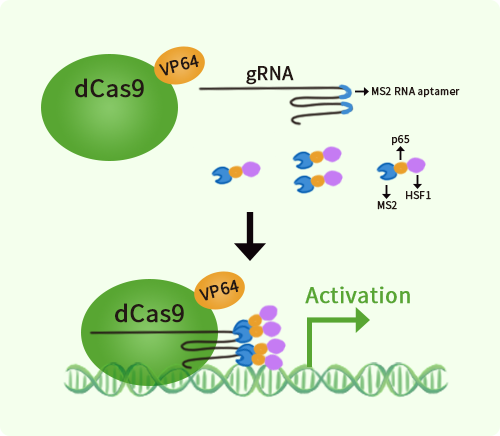Mouse Tcim activation kit by CRISPRa
CAT#: GA208041
Tcim CRISPRa kit - CRISPR gene activation of mouse transcriptional and immune response regulator
CNY 12,255.00
Specifications
| Product Data | |
| Format | 3 gRNAs (5ug each), 1 scramble ctrl (10ug) and 1 enhancer vector (10ug) |
| Symbol | Tcim |
| Locus ID | 69068 |
| Kit Components | GA208041G1, Tcim gRNA vector 1 in pCas-Guide-GFP-CRISPRa GA208041G2, Tcim gRNA vector 2 in pCas-Guide-GFP-CRISPRa GA208041G3, Tcim gRNA vector 3 in pCas-Guide-GFP-CRISPRa 1 CRISPRa-Enhancer vector, SKU GE100056 1 CRISPRa scramble vector, SKU GE100077 |
| Disclaimer | These products are manufactured and supplied by OriGene under license from ERS. The kit is designed based on the best knowledge of CRISPRa SAM technology. The efficiency of the activation can be affected by many factors, including nucleosome occupancy status, chromatin structure and the gene expression level of the target, etc. |
| Reference Data | |
| RefSeq | NM_026931 |
| Synonyms | 1110065B09Rik; AW121743; AW321058 |
| Summary | Seems to be involved in the regulation of cell growth an differentiation, may play different and opposite roles depending on the tissue or cell type. May enhance the WNT-CTNNB1 pathway by relieving antagonistic activity of CBY1. Enhances the proliferation of follicular dendritic cells. Plays a role in the mitogen-activated MAPK2/3 signaling pathway, positively regulates G1-to-S-phase transition of the cell cycle. In endothelial cells, enhances key inflammatory mediators and inflammatory response through the modulation of NF-kappaB transcriptional regulatory activity. Involved in the regulation of heat shock response, seems to play a positive feedback with HSF1 to modulate heat-shock downstream gene expression (By similarity). Plays a role in the regulation of hematopoiesis even if the mechanisms are unknown (PubMed:24937306). In cancers such as thyroid or lung cancer, it has been described as promoter of cell proliferation, G1-to-S-phase transition and inhibitor of apoptosis. However, it negatively regulates self-renewal of liver cancer cells via suppresion of NOTCH2 signaling (By similarity).[UniProtKB/Swiss-Prot Function] |
Documents
Resources
| 基因表达相关资源 |
Other Versions
| SKU | Description | Size | Price |
|---|---|---|---|
| KN300185 | 1810011O10Rik - mouse gene knockout kit via CRISPR, HDR mediated |
CNY 12,260.00 |
|
| KN300185BN | 1810011O10Rik - mouse gene knockout kit via CRISPR, HDR mediated |
CNY 12,260.00 |
|
| KN300185LP | 1810011O10Rik - mouse gene knockout kit via CRISPR, HDR mediated |
CNY 12,260.00 |
|
| KN300185RB | 1810011O10Rik - mouse gene knockout kit via CRISPR, HDR mediated |
CNY 12,260.00 |
|
| KN500185 | 1810011O10Rik - KN2.0, Mouse gene knockout kit via CRISPR, non-homology mediated. |
CNY 8,680.00 |


 United States
United States
 Germany
Germany
 Japan
Japan
 United Kingdom
United Kingdom
 China
China

